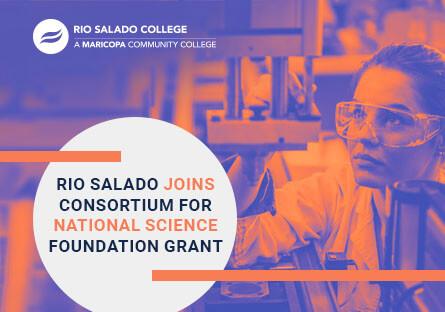This article appears for archival purposes. Any events, programs and/or initiatives mentioned may no longer be applicable.

When it comes to the burgeoning field of nanotechnology, big things do come in small packages! Rio Salado College recently became a sub-grantee for a four-year, $4.6 million, multi-institution grant from the National Science Foundation (NSF). The grant helps the college continue its mission to provide microelectronics and nanomanufacturing training to our students who are military affiliated, including military active duty (within 180 days of separation), veterans and their families. Rio Salado will work under Penn State’s The Center for Nanotechnology Education and Utilization (CNEU) in the Department of Engineering Science and Mechanics.
Research estimates that global demand for nanomanufacturing should double every three years. The U.S. alone could see a potential job growth of 70,000 to 90,000 semiconductor manufacturing jobs as it works to meet growing worldwide demand. It is a very exciting industry full of opportunities for professional advancement for people with the right technical skills: Skills that can be honed in Rio Salado College’s nanotechnology programs.
"Maricopa County has become a tech hub for many international companies with hiring needs for micro- and nano-technicians,” Rio Salado Faculty Chair of Stem Initiatives Dr. Rick Vaughn said. “Rio Salado is excited to expand our capacity to train a new generation of diverse workforce for the expanding semiconductor and photonics industries across the Valley.”
For Dr. Vaughn, nanotechnology is a science where the infinitesimal can contain immensities.
“Nanotechnology is where science, engineering and technology meet—at the nanoscale. With this study, nano technicians are able to manipulate individual atoms and molecules to change the properties of tools and products,” Dr. Vaughn said. “Nanotechnology embodies everything that has to do with engineering, chemistry, biology and science, and then puts them together with technology to form something that’s new and different.”
It isn’t just the Maricopa Community Colleges district embracing the future-forward potential of nanotechnology - which is a major component of semiconductor manufacturing: there’s been a push on a state level to make Arizona a major player in this competitive industry as evident by recent headlines. Phoenix Mayor Kate Gallego recently expressed the Valley is “quickly becoming a global semiconductor hub in the United States.”
The U.S. Senate recently passed the CHIPS Act of 2022, a bipartisan bill that will create tens of thousands of high-paying microchip manufacturing jobs in Arizona. Arizona Sen. Mark Kelly was a lead negotiator of the bill.
“By creating more microchips here at home, our bipartisan legislation will lower costs for everyday goods and strengthen Arizona’s position as a leader in the production and manufacturing of this technology that is critical to our economy and to our country’s national security,” Senator Kelly’s website notes.
Rio Salado College is one of four community colleges participating in NSF grant, along with Tidewater Community College in Norfolk, San Diego’s Southwestern College, and Georgia Piedmont Technical College, in Atlanta. Each college will recruit students for 12-week courses that will prepare them to take their American Society for Testing and Materials (ASTM) certification.
Rio Salado’s training program will run for 12 weeks from 11 a.m. to 1 p.m. (EST) beginning Feb. 8 at ASU’s Engineering Research Center on the main Tempe campus. Stipends will be available. To register for this free program, visit the Penn State Center for Nanotechology Education and Utilization page.
Article by Austin Brietta